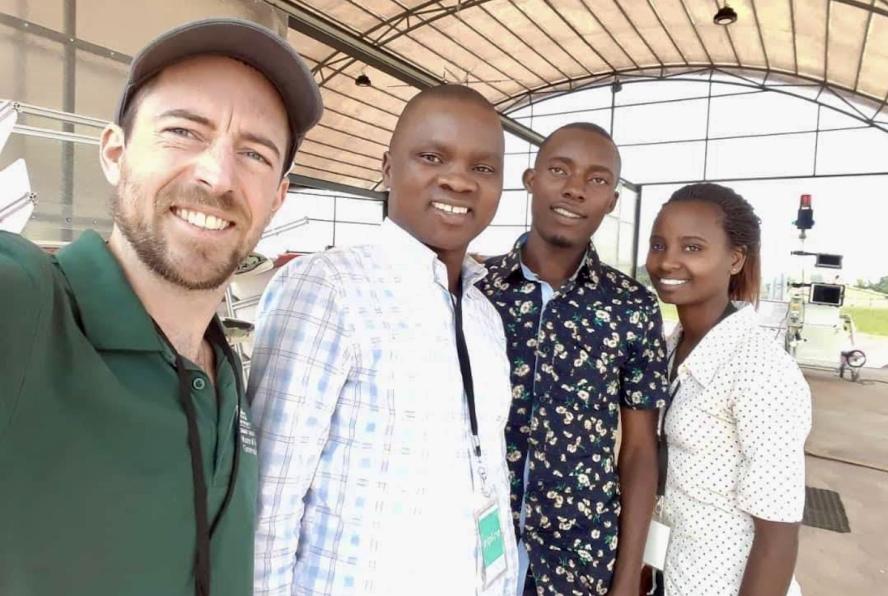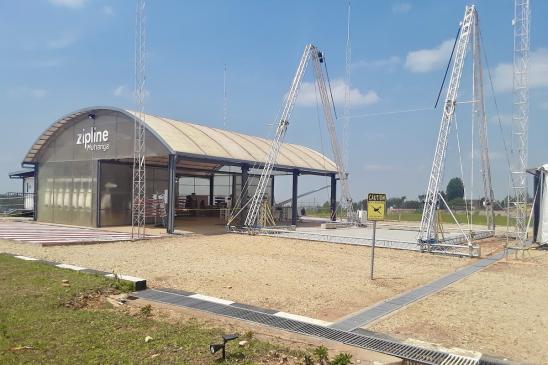-
About
- Leadership & Faculty
- News & Events
-
Academics
- Graduate
- Advanced Clinical Training
- Continuing Education
- Academic Departments
- Academic Offices
- Simulation Experiences
-
Student Life
- Offices
-
Research
-
Hospitals & Clinics
- Emergency Care
- Hospital Services
-
Community Outreach
- Volunteer
Vaccine Delivery by Drone
Published research by Cummings School Ph.D. student analyzes perceptions in Rwanda

A study conducted by Cummings School researchers in collaboration with others, titled “The Use of Drones to Deliver Rift Valley Fever Vaccines in Rwanda: Perceptions and Recommendations,” was published in the March 2023 issue of the journal Vaccines.
Evan Griffith, V21, VG17, a Ph.D. student at Cummings School of Veterinary Medicine, served as lead author. He collaborated with Dr. Hellen Amuguni, an associate professor in the Department of Infectious Disease and Global Health with extensive research experience in eastern Africa as SheVax+ project coordinator; post-doctoral fellow Janna Schurer; Billy Mawindo, a master’s degree student at the University of Global Health Equity (UGHE); and Rita Kwibuka and Theirry Turibyariye of the University of Rwanda School of Veterinary Medicine (UR).
Through the Tufts-UGHE-UR One Health Collaborative [which offered a fellowship program enabling Rwandan fellows to study in the U.S. while Cummings School students worked in Rwanda with UGHE and UR students] Griffith learned about Zipline, a company that delivers items via drone. “They were considering drone use to assist in the animal health sector from a One Health approach,” says Griffith.
Faced with the emergence of Rift Valley Fever (RVF) in Rwanda and its detrimental effects on health, the study analyzed aspects of the delivery of vaccines to locations in the Nyagatare District of its Eastern Province.
An RVF outbreak in 2018 caused hundreds of livestock deaths and abortions, and multiple successive outbreaks have occurred since because most farmers interviewed in the District had not vaccinated their livestock for the mosquito-borne, zoonotic disease. Similar outbreaks have resulted in both significant financial losses and the loss of animals’ lives in Kenya and Tanzania.
“If livestock contract RVF, humans can get it through contact with bodily fluid, such as blood or birthing,” says Griffith. “And about 2% of people who are infected by it die from a hemorrhagic fever … The best way to protect against this is to vaccinate livestock.”
The use of drones to supplement healthcare supply chains and provide last-mile vaccine delivery has been effective in countries such as Democratic Republic of the Congo, Malawi, Mozambique, and Vanuatu, in recent years. This was the first study examining the perceptions of drone use in the veterinary health sector, and the findings aligned accordingly with previous research on drone delivery in human health supply chains.
“In most of these instances, you’re dealing with long distances, warm temperature, and poor road infrastructure,” Griffith explains. “They exist in both the human and veterinary health sectors.”
Working with veterinarians and drone delivery personnel to evaluate the supply chain, the team identified the challenges, and determined the potential effectiveness of drone delivery of supplies. “We found that the distance needed to travel with the vaccines was a limitation,” says Griffith, “and since veterinarians used a motorbike with a cold box to deliver vaccines, their effectiveness could be compromised since they need to stay around 2–8° Celsius (36–48° F).”
Decreased transportation time, improved cold chain maintenance, and cost savings were the possible benefits of drone delivery. Based on their findings, the researchers recommended further investigation into opportunities to expand drone delivery in the animal health sector.
When discussing how drones could contribute to livestock vaccination, local veterinarians suggested that the vaccines be delivered to human health clinics located in centralized locations, where the veterinarians could pick them up and vaccinate farmers’ livestock.
Since the conclusion of the study, the Rwandan government and Zipline partnered to start delivery of RVF vaccines to Nyagatare District in 2020, says Griffith. “I don’t know how direct the link between our 2019 research and their adoption of it as a practice was, but the model of vaccine delivery they are using is exactly what we talked about.”
In addition, an agrovet shop in Nyagatare where Turibyariye works, has acquired a solar refrigerator from the SheVax+ project. “Now the sector vets are using that fridge to store the RVF vaccines that are being delivered by drone,” Griffith shares.
In 2022, drones delivered 70,000 RVF vaccines to Nyagatare District, up from 20,000 delivered typically. As part of his Ph.D. dissertation, Griffith intends to work with Amuguni and Zipline to analyze the impact. “We want to understand the health and well-being outcomes across the human and livestock space as a result of this One Health drone delivery service.”
